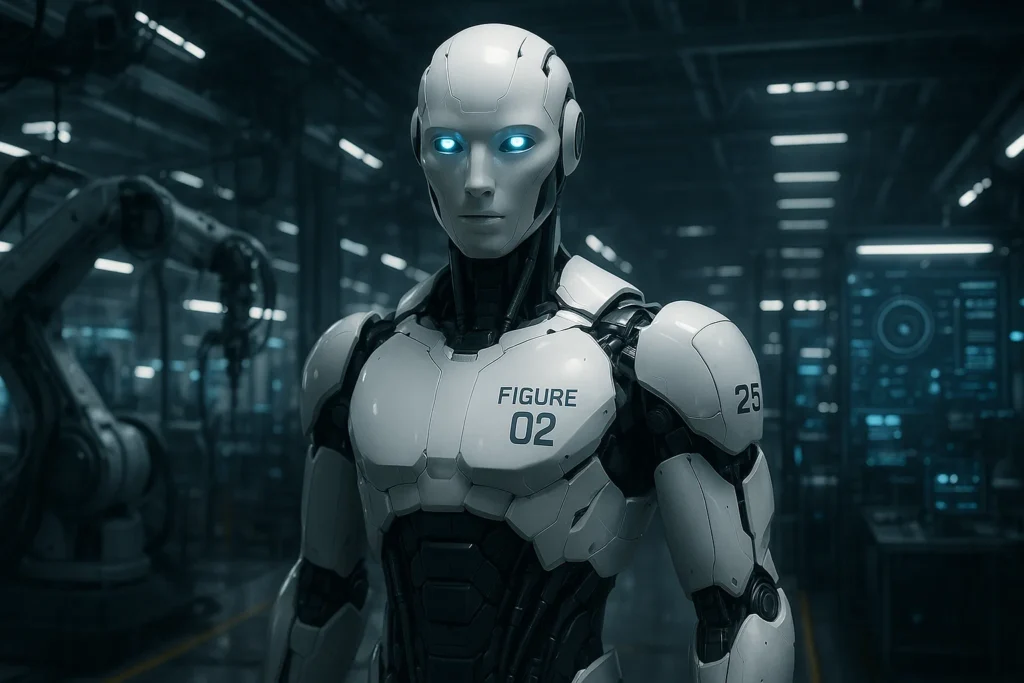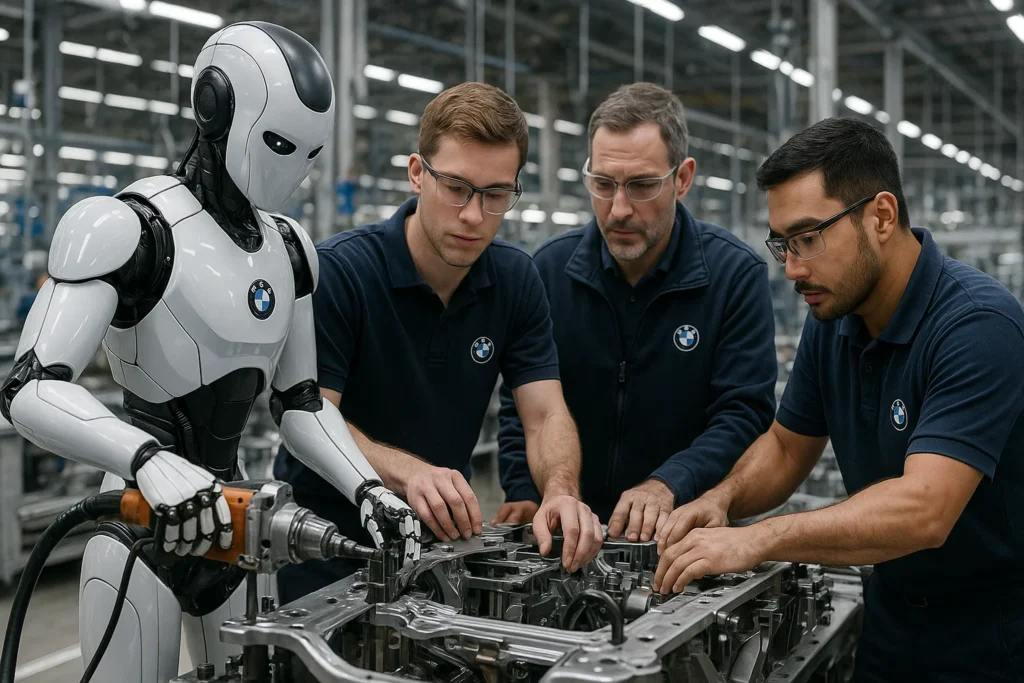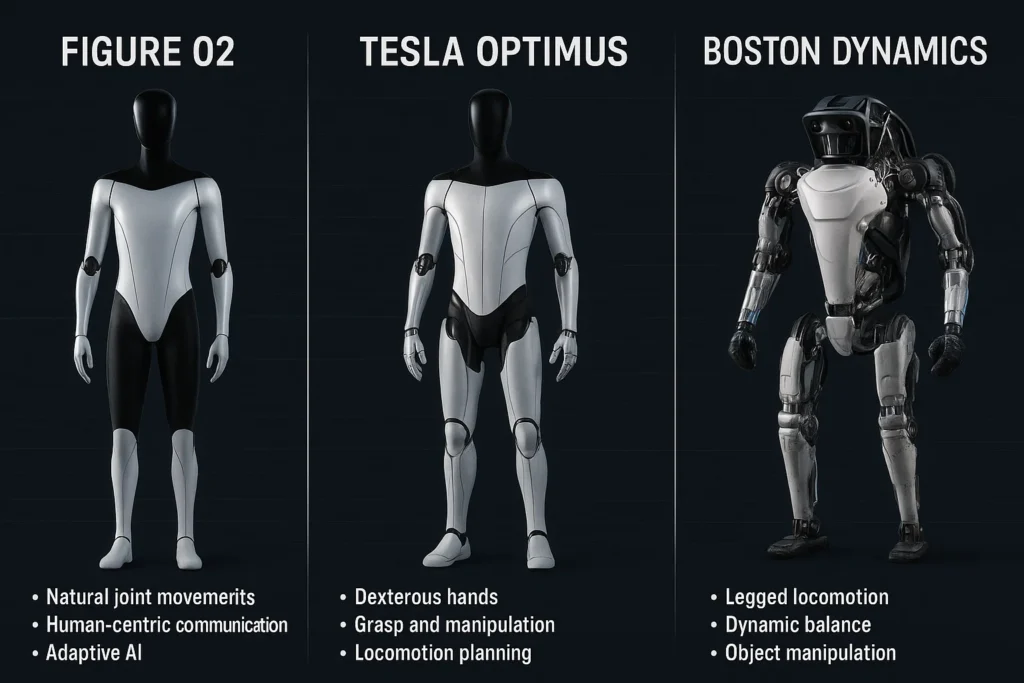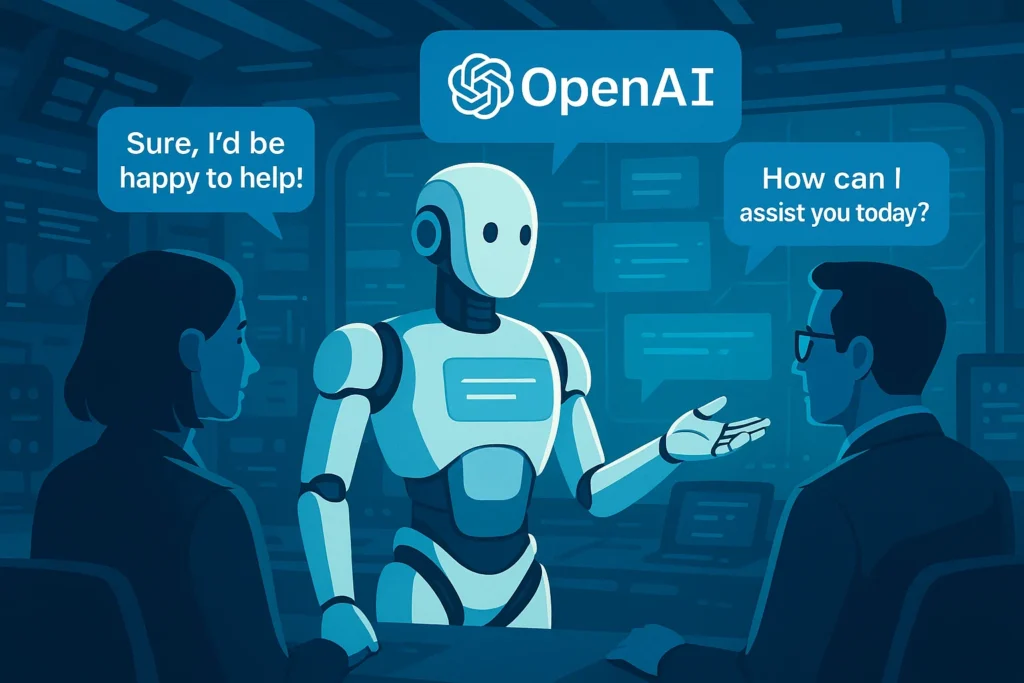
Introduction: The Rise of Humanoid Robots in 2025
In 2025, humanoid robots are no longer confined to the realms of science fiction. With advancements in artificial intelligence and robotics, the world is witnessing the rapid evolution of machines that not only look human but think and act like one. Among the top contenders in this futuristic race is Figure 02, the humanoid robot developed by Figure AI and powered by OpenAI’s language models. The rise of humanoid robots in factories, logistics, customer service, and healthcare is transforming the way we work and live.
As industries face labor shortages and rising operational costs, intelligent robots like Figure 02 provide scalable, flexible, and cost-effective solutions. This blog explores Figure 02 in depth, from its physical attributes to its groundbreaking AI capabilities, real-world uses, and how it stacks up against its competition like Tesla Optimus and Boston Dynamics’ Atlas.
What is Figure 02?
Figure 02 is the latest humanoid robot developed by Figure AI, a robotics company focused on building general-purpose AI-powered robots. Launched in 2024 and refined into 2025, Figure 02 aims to replace humans in repetitive, hazardous, and labor-intensive jobs.
Physical Features
Height: Approximately 5 feet 6 inches (168 cm)
Weight: Around 60 kg (132 lbs)
Mobility: Bipedal locomotion with dynamic balancing
Materials: Lightweight aluminum and polymer frame
Actuators: Custom electric actuators for human-like movement
Power Source: Battery-powered with modular packs for extended usage
Capabilities
Human-like dexterity to handle tools and materials
Real-time vision processing to navigate complex environments
Speech interaction via OpenAI’s language models
Autonomous task planning and execution
Learning by demonstration, allowing it to mimic human actions
OpenAI Integration: The Brain Behind Figure 02
What truly sets Figure 02 apart is its integration with OpenAI’s advanced language models, including GPT-4 and beyond. This collaboration allows the robot to:
Understand natural language commands
Communicate fluently in conversations
Make context-aware decisions
Learn from both written and spoken instructions
OpenAI’s models enhance Figure 02’s ability to reason, adapt, and interact, making it more than just a robotic shell—it becomes an intelligent co-worker.
Related: OpenAI partners with Figure AI to bring intelligence to robots

Real-World Applications: From BMW to Warehouses
Figure 02 is not just a prototype—it has been deployed in real-world industrial settings, most notably at BMW’s manufacturing facility in South Carolina. Here’s how it’s being used:
BMW Factory Use-Cases
Assembly line support: Figure 02 assists in repetitive and ergonomic-heavy tasks.
Inventory management: Scans and categorizes components.
Quality checks: Uses vision and AI to inspect parts.
Other Applications
Warehousing and logistics: Picking, packing, and sorting items.
Healthcare: Assisting elderly patients and moving supplies.
Retail and hospitality: Greeting customers and providing product information.
Agriculture: Harvesting crops and monitoring soil health.
Figure 02 vs Tesla Optimus vs Boston Dynamics Atlas

| Feature | Figure 02 | Tesla Optimus | Boston Dynamics Atlas |
|---|---|---|---|
| Developer | Figure AI | Tesla Inc. | Boston Dynamics |
| Launch Year | 2024 | 2022 (concept), refined in 2024 | 2013 (active research) |
| AI Integration | OpenAI GPT | Tesla Dojo + Neural Net | Internal algorithms |
| Primary Focus | General-purpose industrial robot | Manufacturing, logistics | Research & agility demonstration |
| Dexterity Level | High | Medium | Very High |
| Language Understanding | Advanced (via OpenAI) | Limited | Basic |
| Commercial Deployment | Active (BMW) | In testing phase | Research labs |
Summary:
Figure 02 shines in communication and task adaptability.
Optimus focuses more on Tesla factory automation.
Atlas excels in physical agility but lacks conversational AI.
Benefits and Challenges of Figure 02 and Similar Robots
Pros
Increased productivity: Works 24/7 with minimal fatigue
Workplace safety: Reduces human exposure to dangerous tasks
Consistency: Eliminates human error in repetitive jobs
Adaptability: Learns and updates tasks based on feedback
Labor shortage solution: Ideal for sectors struggling to hire
Cons
High initial cost: Expensive to develop and deploy
Job displacement: Threat to low-skill labor markets
Security concerns: Risk of AI misuse or hacking
Ethical concerns: Human-like robots may confuse boundaries

The Future of Robotics in 2025 and Beyond
With robots like Figure 02 leading the charge, the future of robotics in 2025 looks promising and complex. According to experts, we can expect:
Wider adoption in homes and public services
Smarter AI integration across hardware
More ethical regulations and usage guidelines
Global competition among robotics companies
These developments could reshape global economies, supply chains, and even social interactions.
Conclusion: What Figure 02 Means for the World
Figure 02 by Figure AI, powered by OpenAI, represents the pinnacle of robotics and artificial intelligence integration in 2025. Its deployment in places like BMW’s factory proves it’s not just a concept but a game-changer.
By blending advanced language understanding, human-like dexterity, and real-time decision-making, Figure 02 is setting new standards in how machines coexist with humans. While challenges exist—particularly around ethics and employment—the potential benefits for productivity, safety, and innovation are enormous.
The world is stepping into an era where machines are not just tools but intelligent collaborators.
FAQ
Figure 02 is a humanoid robot developed by Figure AI and powered by OpenAI. It performs human-like tasks and understands natural language commands.
OpenAI provides the language model that allows Figure 02 to understand and respond to complex instructions, making it highly interactive.
It is currently deployed in industrial settings, including BMW’s manufacturing plant, where it assists with tasks like assembly and inventory.
Figure 02 is more advanced in language understanding and task flexibility, while Tesla Optimus focuses on automating Tesla's production.
It may replace some manual jobs, but it also creates opportunities in robotics management, AI training, and maintenance roles
Related Keywords
figure 02 robot, figure ai humanoid, openai humanoid robot, figure ai robot bmw, future of robotics 2025, best ai robot 2025, ai robots in factories, openai powered robots, humanoid robots 2025, figure 02 vs tesla optimus, boston dynamics vs figure 02, ai robot features, ai robot use in manufacturing, intelligent robots 2025, openai integration in robots, factory automation ai robots, humanoid automation, industrial ai robots, robotics trends 2025, openai robotics partnership
